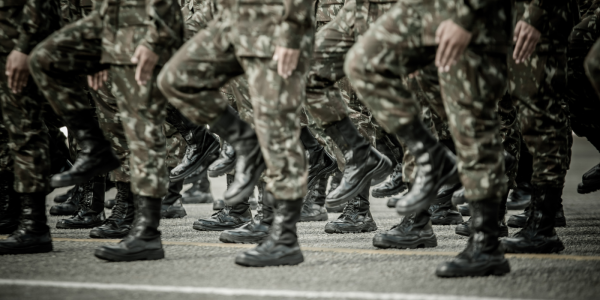Armed forces overseas
Most members of the armed forces will spend time working overseas during their service career. Depending on where you are posted, you may or may not be accompanied by your family. The time you spend working abroad will also vary. How you will be taxed might depend on both these facts. Here we look at the main tax considerations if you usually live and work in the UK but spend time working overseas.

Content on this page:
Tax
As a ‘crown servant’, the salary and allowances you receive from the armed forces will continue to be taxed in the UK as normal. This is irrespective of the length of time you are outside the UK and whether or not you remain UK tax resident or become non-resident in the UK for tax purposes.
However, the taxation of any other income you receive is dependent upon your residence status.
You can find a brief guide to the taxation of crown servants abroad on GOV.UK.
The one exception to the above rule is where all of the following apply:
- You were recruited overseas to the armed forces.
- You are not resident in the UK.
- The maximum rate of pay for your grade is less than that of an executive officer in the UK civil service working in Inner London.
Note carefully that this exception does not include, after 12 June 2006, any Royal Gurkha Officers or members of the Brigade of Gurkhas who were recruited in Nepal. If this exception applies, your earnings will be outside the scope of UK tax provided they relate to non-UK duties performed while non-resident in the UK.
If you have income other than your armed forces salary, whether this will be taxed in the UK depends on where the income arises and your UK tax residence position.
See UK tax for UK residents on foreign income and gains and UK tax for non-UK residents on UK income and gains.
National Insurance contributions
Most people who work in the UK pay National Insurance contributions (NIC) in addition to paying tax on their earned income. If you leave the UK to work abroad for the armed forces, you are likely to continue paying UK NIC because of who you work for.
However, you will need to check if you have to pay social security in the country where you are working.
If the other country has a social security agreement with the UK, this is likely to say that you do not need to pay social security in the country where you are working, but it may be necessary to apply for a certificate from the NIC&EO International Caseworker to show this.
If the other country does not have a social security agreement with the UK, you may have to pay social security in the other country as well as the UK.
You can find more information on NIC if you go abroad, including for members of the armed forces, on GOV.UK.
Your social security position may be more complicated if you were recruited overseas and/or have never set foot in the UK – you may need to seek professional advice.
If you have another job or are self-employed whilst working abroad then you may have to pay the equivalent of NIC in respect of that work in the country in which you are living.
Personal allowance
As a member of the armed forces, you will continue to receive your tax-free personal allowance to set against any income that is taxable in the UK, irrespective of whether you are resident or non-resident.
You may still be able to claim marriage allowance if you are posted abroad, provided you get a personal allowance.
Overseas tax liabilities
Whether you have any overseas tax liability will depend upon the tax rules of the country you are working in. Generally, we would expect that you might have a tax liability or reporting requirement if you have income that arises in the country where you are working and that income does not relate to your armed forces service.
If there is a double taxation agreement between the UK and the country you are working in, it will normally specifically exempt your employment income from the armed forces from tax in the country you are working in (under the Government Service article). However, all agreements are different, and this exemption may not apply in certain circumstances, for example if you are also a national of the country you are working in.
We cannot give specific information relating to the tax systems of countries other than the UK. However, to the extent that you find yourself taxable on the same income in another country as well as the UK at the same time, you can read more about the different methods of dealing with double taxation here.
You can find double taxation agreements between the UK and other countries on GOV.UK.
Capital gains tax
If you dispose of an asset whilst you are resident abroad, you may still have a liability to capital gains tax in the UK.
You might also have a liability to capital gains tax in the country you are living in and, like income tax, there are provisions to mitigate any double taxation.
If you think you might dispose of an asset whilst you are living abroad, you should seek specialist advice on whether you will have to pay capital gains tax. We tell you how you can find a professional tax adviser in our Getting help pages.
Accompanying partners
Tax
Each individual’s tax residence position is determined separately. Your spouse or civil partner will need to establish what their own tax position is in accordance with the general principles set out above.
However, if you are eligible for split year treatment in your tax year of departure as a result of starting full-time work overseas and your non-working partner accompanies you on your overseas posting, then they may also qualify for split-year treatment provided certain other conditions are met. See Split year treatment on leaving the UK.
If your partner works abroad then we would expect their earnings from their work to be taxable in the country they are working in. In addition, they may also need to pay social security contributions in that country.
If your partner does not accompany you on your overseas posting and instead remains in the UK, they will likely remain tax resident in the UK.
National Insurance contributions
If your spouse or civil partner has accompanied you on your overseas posting, they can apply for Class 1 NIC credits. This means that they are treated as having paid UK social security contributions whilst they are abroad with you and there is no gap in their contribution history.
Certain UK state benefits are dependent upon the individual’s NIC record, such as the state pension, so it is important that your spouse or civil partner applies for these credits to ensure they have as few gaps in their contribution record as possible. They can apply for Class 1 NIC credits using form MODCA1 which is available on GOV.UK. The form must be completed and sent to HMRC before the end of the tax year following your return to the UK.
If they are too late to claim credits as above, or they accompanied you on an overseas posting before 6 April 2010, but after 5 April 1975, they can claim Class 3 NI credits by completing the application form that is also on GOV.UK.
Social security benefits
As a member of the armed forces you (and your partner) may be able to continue to claim certain state benefits, such as tax credits, during your overseas posting. There are certain conditions you have to fulfil and you can find out about these on GOV.UK. Generally, so long as you normally live in the UK and were living here before you were first posted abroad, then you will qualify.
Similarly, you can get child benefit while you work abroad as a member of the armed forces provided that, just before you were posted abroad, you were either:
- living in the UK and it was your main home, or
- posted to the UK.
You can get child benefit while you work abroad as a member of the armed forces whether your child goes abroad with you or stays in the UK.
HMRC normally pay child benefit into a bank account in the UK.
You or your spouse or civil partner may also be entitled to benefits in the country to which you are posted but this will depend upon the country. A common example is “Kindergeld” – the equivalent of child benefit in Germany.
Further help
Members of the armed forces living overseas can contact HMRC on the Crown servants helpline to discuss income tax or capital gains tax queries.
You can contact HMRC on the National Insurance: non-UK residents helpline to discuss NIC queries.



